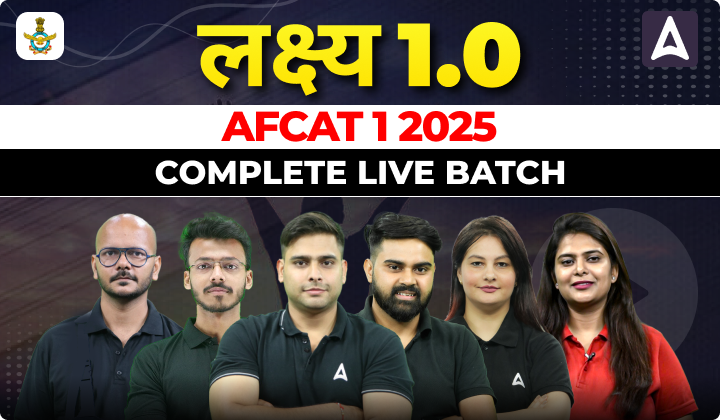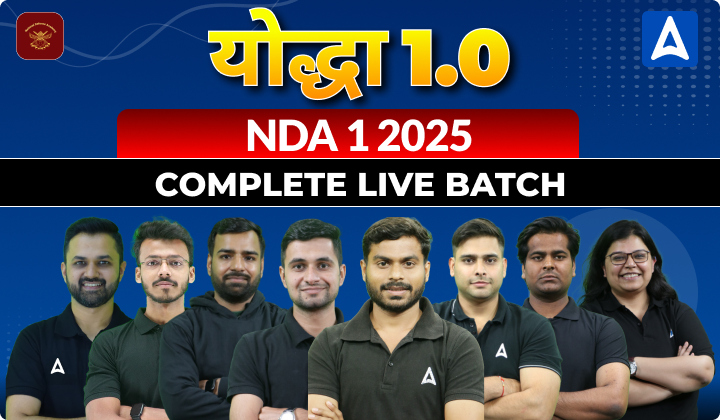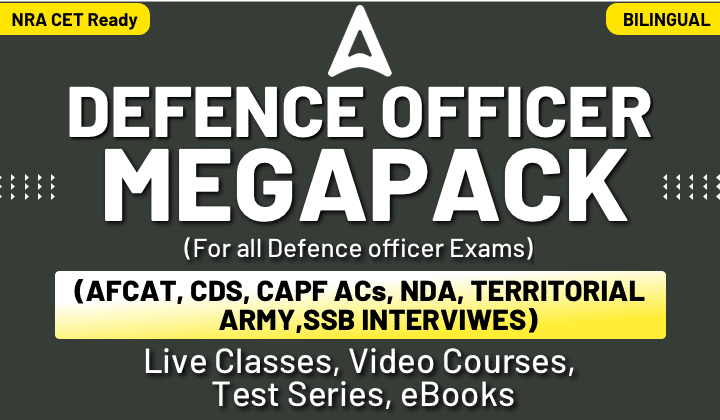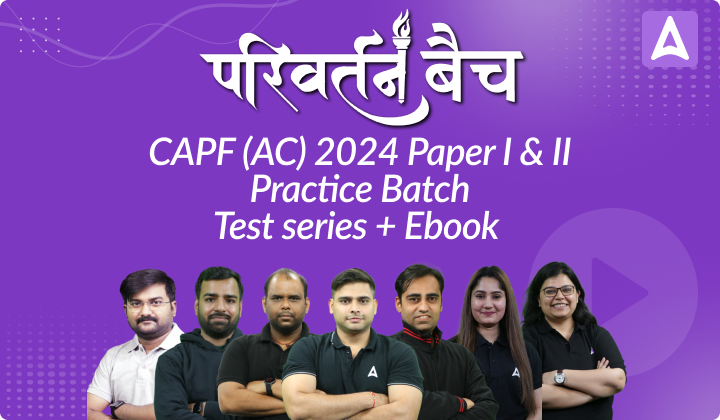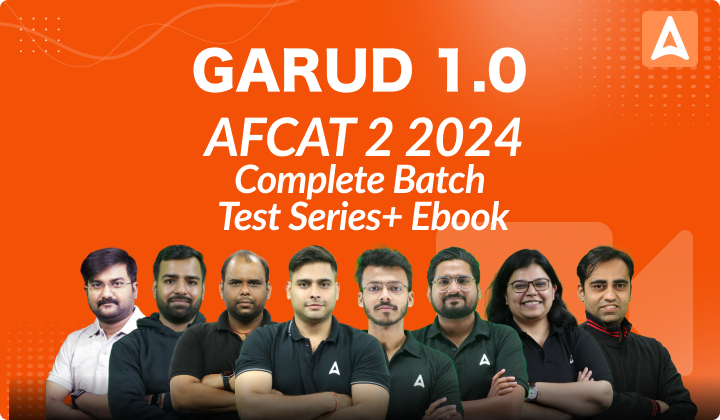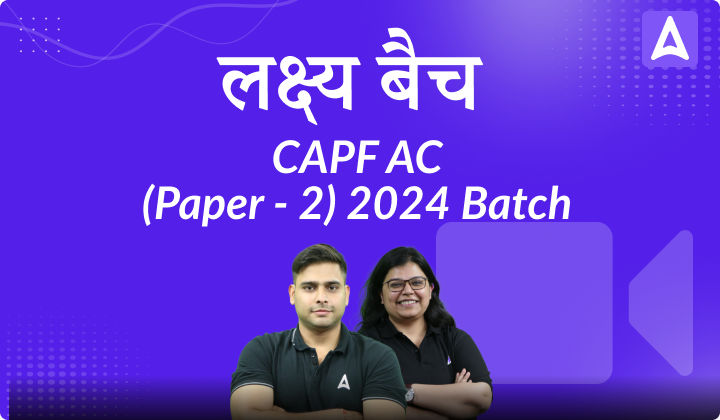If you’re preparing for the Agniveer Vayu exam and need to enhance your English skills, this resource is just what you need. We’ve compiled a set of carefully selected English language questions, along with thorough explanations, designed to help you master key concepts and refine your approach to the exam. By practicing with Agniveer Vayu English Questions, you’ll not only improve your language proficiency but also gain the confidence to tackle the exam successfully. Dive into the following exercises to elevate your preparation and achieve your goals.
Agniveer Vayu English Questions
English plays a crucial role in the Agniveer Vayu exam and can be challenging for many candidates to grasp fully. To help ease your preparation, we’ve compiled a set of key English questions specifically designed for this exam. Each question is accompanied by a detailed solution and correct answer, allowing you to reinforce your understanding and improve your overall performance. By working through these questions, you’ll strengthen your skills and boost your readiness for the exam.
Important Topics of English for Agniveer Vayu
It is very important for the candidates preparing for the Agniveer Vayu exam to have knowledge of all the subjects. Today we will share it with you along with all the important points and syllabus of the English subject. The detailed description of the English syllabus of Agniveer Vayu is presented in the table below.
| Topic |
Description |
| Fillers | Questions that require candidates to fill in the blanks with appropriate words based on context. |
| Adverbs | Understanding the function and usage of adverbs in sentences, including types (manner, place, time). |
| Paragraph Completion | Completing given paragraphs by selecting appropriate sentences to maintain coherence and meaning. |
| Tenses | Knowledge of different tenses (present, past, future) and their correct usage in sentences. |
| Prepositions | Understanding how to use prepositions correctly to indicate relationships between words. |
| Adjectives | Identifying and using adjectives to describe nouns, including comparative and superlative forms. |
| Antonyms and Synonyms | Recognizing words with opposite meanings (antonyms) and similar meanings (synonyms). |
| Grammatical Error | Identifying and correcting errors in sentence structure, punctuation, and grammar. |
| Determiners | Understanding the use of determiners (articles, demonstratives, possessives) in sentences. |
| Cloze Test | Completing a passage with appropriate words or phrases based on context and meaning. |
| Sentence Completion | Choosing the correct word or phrase to complete sentences meaningfully. |
| Reading Comprehension | Analyzing and understanding written passages followed by answering related questions. |
Agniveer Vayu English Questions
Q1. Some parts of a sentence have been jumbled up, and labelled P, Q, R and S. Select the option that gives the correct sequence in which these parts can be rearranged to form a meaningful and grammatically correct sentence. Dr. Freud believes that people with
P. the mirror conclusively proving their
Q. schizophrenia cannot identify themselves
R. in the mirror and try to reach on the other side of
S. inability to distinguish themselves from their reflection.
(a) QRPS
(b) QPRS
(c) QPSR
(d) QRSP
S1. Ans (a)
Sol. “Q” (Schizophrenia cannot identify themselves): This part introduces the main idea that people with schizophrenia have difficulty identifying themselves.
- “R” (in the mirror and try to reach on the other side of): This part provides additional context about what happens when they look in the mirror.
- “P” (the mirror conclusively proving their): This part connects with the previous segment to explain the significance of the mirror.
- “S” (inability to distinguish themselves from their reflection): This is the concluding part that explains the consequence of their inability to identify themselves.
- The correct sequence (a) QRPS forms a coherent and meaningful sentence, explaining Dr. Freud’s belief about people with schizophrenia and their difficulty in recognizing themselves in the mirror.
Q2. Find the part of the given sentence that has an error in it. If there is no error, choose ‘No error’.
The show is about two couples (1)/ and the adventures of (2)/ their rebellious offsprings. (3)/ No Error (4)
(a) The show is about two couples
(b) and the adventures of
(c) their rebellious offsprings.
(d) No Error
S2. Ans (c)
Sol. The error is in part (c) of the sentence where “offsprings” should be corrected to “offspring.” The correct term is “offspring,” which is both singular and plural, whereas “offsprings” is the incorrect plural form.
- So, the corrected sentence reads: “The show is about two couples and the adventures of their rebellious offspring.”
Grammatical Rule Used:
- Certain nouns have the same form in both singular and plural. These are often referred to as invariant or uncountable nouns when they denote a collective or an indeterminate quantity. “Offspring” falls into this category.
- Example:
Correct: They are worried about the future of their offspring.
Incorrect: They are worried about the future of their offsprings.
Q3. Select the most appropriate ANTONYM of the given word.
Farrago
(a) Order
(b) Medley
(c) Mishmash
(d) Hodgepodge
S3. Ans (a)
Sol. The correct antonym of the given word is (a) Order.
- Farrago: a confused mixture; hodgepodge.
- Farrago: (गड़बड़झाला)
Example: The article was a farrago of half-truths and outright lies. - Order: the arrangement or disposition of people or things in relation to each other according to a particular sequence, pattern, or method.
Example: The books were arranged in order on the shelf, making it easy to find them. - Synonyms: medley, mishmash, hodgepodge, jumble.
- Antonyms: order, organization, system, structure.
Meanings of all the other given options:
- Medley: a varied mixture of people or things.
- Mishmash: a confused mixture.
- Hodgepodge: a confused mixture; a hotchpotch.
Q4. Select the most appropriate synonym of the given word.
Trenchant
(a) Mild
(b) Dull
(c) Incisive
(d) Blunt
S4. Ans (c)
Sol. The correct synonym of the given word “Trenchant” is (c) “Incisive.”
- Trenchant means vigorous or incisive in expression or style.
- Meaning of the given word in Hindi: पैना
Example: She delivered a trenchant analysis of the company’s financial problems. - Incisive means (of a person or mental process) intelligently analytical and clear-thinking.
Example: He was known for his incisive remarks that often left a strong impression. - Synonyms: sharp, keen, acute, incisive.
- Antonyms: mild, dull, blunt, vague.
- Meanings of all the other given options:
Mild: not severe, serious, or harsh.
· Dull: lacking interest or excitement.
· Blunt: having a worn-down edge or point; not sharp.
Q5. Identify the word that is spelled INCORRECTLY.
(a) Preeminent
(b) Heterogenious
(c) Unprecedented
(d) Multifaceted
S5. Ans (b)
Sol. Option (b) is the incorrectly spelled word.
Correct spelling: “Heterogeneous: diverse in character or content.”
- Example: A heterogeneous collection of artworks that spans several centuries.
Meanings of all the given options:
- Preeminent: surpassing all others; very distinguished in some way.
- Unprecedented: never done or known before.
- Multifaceted: having many sides.
Q6. Select the most appropriate meaning of the given idiom.
At loggerheads
(a) in a state of confusion
(b) in a state of rest
(c) in a state of agreement
(d) in a state of disagreement
S6. Ans (d)
Sol. Option d is the correct meaning of the given word.
• At loggerheads: This idiom describes a situation where individuals or groups are involved in a stubborn conflict or disagreement.
• Idiom used in sentence- The two departments have been at loggerheads over the budget allocations for months.
Q7. Select the most appropriate word to fill in the blank.
As far as we know, blue feathers in birds have been _________________ uncommon through time.
(a) fairly
(b) hardly
(c) rarely
(d) barely
S7. Ans (a)
Sol. The word that can be filled in the blank is ‘fairly’ to make the sentence grammatically and contextually correct.
- ‘Fairly’ means to a moderate extent; quite; reasonably, which fits well in the context of the sentence indicating that blue feathers in birds have been moderately uncommon through time.
- As per the context, the word ‘fairly’ fits in very well, suggesting that while not extremely rare, blue feathers are not common either.
Meanings of other given words:
- Hardly – scarcely; barely; almost not, but it doesn’t convey the idea of moderate rarity as needed in the sentence.
- Rarely – not occurring often; infrequently, which implies a lesser frequency than what is intended in the sentence.
- Barely – scarcely; hardly, but it emphasizes a sense of minimal occurrence rather than moderate rarity.
- Thus, all the other given words have different meanings or intensities and do not fit precisely in the context of the sentence.
Directions (8-10): Read the given passage and answer the questions that follow.
With the rapid rise of technology, the way people work and interact with their jobs has drastically changed. Remote work has become a norm, with many companies offering flexible work arrangements to attract and retain talent. The benefits of remote work are numerous, including increased productivity, better work-life balance, and access to a global talent pool. However, it also presents challenges, such as managing communication across time zones and ensuring employee engagement from a distance. Companies are now investing in virtual tools and platforms that facilitate collaboration, aiming to bridge the gap between remote and in-office workers. Despite these efforts, the lack of face-to-face interaction can sometimes lead to feelings of isolation among employees, making it essential for businesses to implement strategies that promote team cohesion and mental well-being.
Q8. According to the passage, which of the following is NOT a benefit of remote work?
(a) Increased productivity
(b) Better work-life balance
(c) Access to a global talent pool
(d) Guaranteed team cohesion
S8. Ans (d)
Sol. The correct answer is “Guaranteed team cohesion,” which is not mentioned as a benefit of remote work.
- The passage highlights several benefits of remote work, such as increased productivity, better work-life balance, and access to a global talent pool. However, it also notes that maintaining team cohesion is a challenge, not a benefit, making (d) the correct choice.
Q9. According to the passage, what is one of the challenges of remote work?
(a) Increased productivity
(b) Ensuring employee engagement from a distance
(c) Access to a global talent pool
(d) Better work-life balance
S9. Ans (b)
Sol. The correct answer is “Ensuring employee engagement from a distance,” which is mentioned as a challenge of remote work.
- The passage highlights the difficulty in managing communication and maintaining engagement among remote workers, making this a key challenge identified in the text.
Q10. What percentage of people feel isolated due to the lack of face-to-face interaction, according to the passage?
(a) 30%
(b) 40%
(c) The passage does not specify a percentage.
(d) 50%
S10. Ans (c)
Sol. The passage does not specify a percentage of people who feel isolated due to the lack of face-to-face interaction.
- The passage mentions that feelings of isolation can occur due to remote work, but it does not provide any specific percentage, making (c) the correct answer.
Q11. Select the most appropriate idiom that means the same as the given sentence.
She acts sweet and supportive, but she actually spreads rumors about her friends.
(a) Hoist with one’s own petard
(b) Fair-weather friend
(c) A snake in the grass
(d) The sword of Damocles
S11. Ans. (c)
Sol. The correct idiom that means the same as the given sentence is “a snake in the grass.”
- Given sentence: The sentence describes someone who pretends to be sweet and supportive but secretly harms others by spreading rumors.
- A snake in the grass: This idiom refers to a person who pretends to be a friend but is actually treacherous or deceitful.
Meanings of all other options:
- Hoist with one’s own petard: It means to be harmed by one’s own plan intended to harm someone else.
- Fair-weather friend: A person who is a friend only when circumstances are pleasant or profitable.
- The sword of Damocles: A constant and imminent peril.
The most fitting description for the situation in the question is (c) a snake in the grass.
Q12. Select the word which means the same as the group of words highlighted in the given sentence.
The artist credited his success to his wife, who had always been a person who is a source of artistic inspiration for his most famous paintings.
(a) Muse
(b) Patron
(c) Artist
(d) Protégé
S12. Ans. (a)
Sol. The correct one-word substitution for “a person who is a source of artistic inspiration” is (a) muse.
• “Muse” precisely describes a person or personified force who is the source of inspiration for a creative artist.
- Correct word: प्रेरणा स्रोत (Muse in Hindi)
• Use in a sentence: The poet often referred to his wife as his muse.
• Meanings of the given other options: - Patron – A person who gives financial or other support to a person, organization, or cause.
- Artist – A person who produces paintings or drawings as a profession or hobby.
- Protégé – A person who is guided and supported by an older and more experienced or influential person.
Q13. The following sentence has been split into four segments. Identify the segment that contains an error.
If they had completed / their project on time, / they would receive / more recognition.
(a) If they had completed
(b) their project on time
(c) they would receive
(d) more recognition
S13. Ans. (c)
Sol. The segment (c) “they would receive” is incorrect.
Correct Form: “they would have received”
Explanation: The sentence structure provided follows the pattern of the third conditional, which is used to talk about past situations that did not happen and their hypothetical results. The third conditional is formed using the following structure:
- If-Clause: Past Perfect (had + past participle)
- Main Clause: Would + have + past participle
In the given sentence:
- If-Clause: “If they had completed their project on time” – This part is correctly using the Past Perfect tense, indicating a hypothetical past action.
- Main Clause: The error occurs here because it uses “would receive,” which is a form used in the second conditional or future hypotheticals, not past.
Grammatical Rule: For third conditional sentences, the main clause must use “would have” followed by the past participle of the main verb to properly express the hypothetical outcome of a past situation that did not occur. This structure reflects a speculative result had the condition been met.
Corrected Sentence: “If they had completed their project on time, they would have received more recognition.”
Example:
- Incorrect: “If he had studied, he would pass the exam.”
- Correct: “If he had studied, he would have passed the exam.”
This correction aligns the sentence with the proper conditional structure, accurately reflecting a past hypothetical scenario and its possible outcome.
Q14. Select whichever option you consider the most appropriate for the blank space and indicate your response accordingly.
If he _____ harder, he would have passed the exam.
(a) studied
(b) studies
(c) had studied
(d) has studied
S14. Ans. (c)
Sol. The most appropriate option for completing the sentence “If he _____ harder, he would have passed the exam.” is (c) “had studied.”
- Explanation: The sentence structure follows the third conditional, which is used to discuss hypothetical situations in the past and their possible outcomes. The third conditional is formed with the past perfect tense in the ‘if’ clause (had + past participle) and ‘would have + past participle’ in the main clause.
- Correct Form: “If he had studied harder, he would have passed the exam.”
Meanings of all other options:
- studied: Simple past tense, used for completed actions in the past, but does not fit here because the condition is hypothetical.
- studies: Present tense, used for habitual or current actions, inappropriate for a hypothetical past condition.
- has studied: Present perfect tense, used for actions completed at some point in the past before now, but not suitable for a hypothetical past condition.
The use of the past perfect tense in option (c) correctly sets up the hypothetical nature of the condition that did not actually occur.
Q15. Select the most appropriate ANTONYM of the given word.
Prolix
(a) Succinct
(b) Verbose
(c) Wordy
(d) Diffuse
S15. Ans. (c)
Sol. The correct antonym of the given word is (a) Succinct.
- Prolix: using or containing too many words; tediously lengthy.
- Prolix: (बहुशब्दी)
Example: The prolix speech bored the audience to tears. - Succinct: briefly and clearly expressed.
Example: Her succinct summary captured the essence of the debate. - Synonyms: verbose, wordy, diffuse, long-winded.
- Antonyms: succinct, concise, brief, pithy.
Meanings of all the other given options:
- Verbose: using or expressed in more words than are needed.
- Wordy: using or containing too many words.
- Diffuse: spread out over a large area; not concentrated.
Agniveer Vayu English Questions PDF
If you’re interested in accessing all these questions in PDF format, you can download the Agniveer Vayu Reasoning Questions PDF through the link provided below. Candidates can easily obtain it by clicking the link.




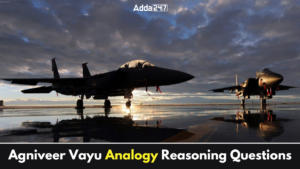 Agniveer Vayu Analogy Reasoning Question...
Agniveer Vayu Analogy Reasoning Question...
 Agniveer Vayu Reasoning Questions Booste...
Agniveer Vayu Reasoning Questions Booste...
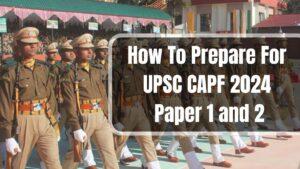 How To Prepare For UPSC CAPF 2024 Paper ...
How To Prepare For UPSC CAPF 2024 Paper ...



